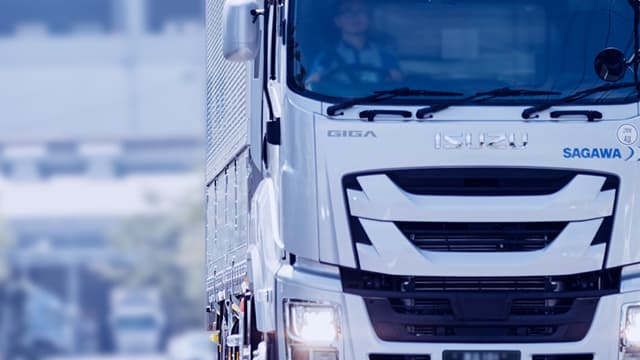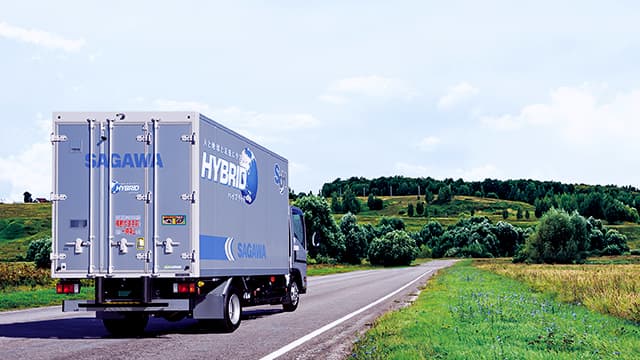Climate Change
Decarbonization Vision
SG Holdings Group Decarbonization Vision
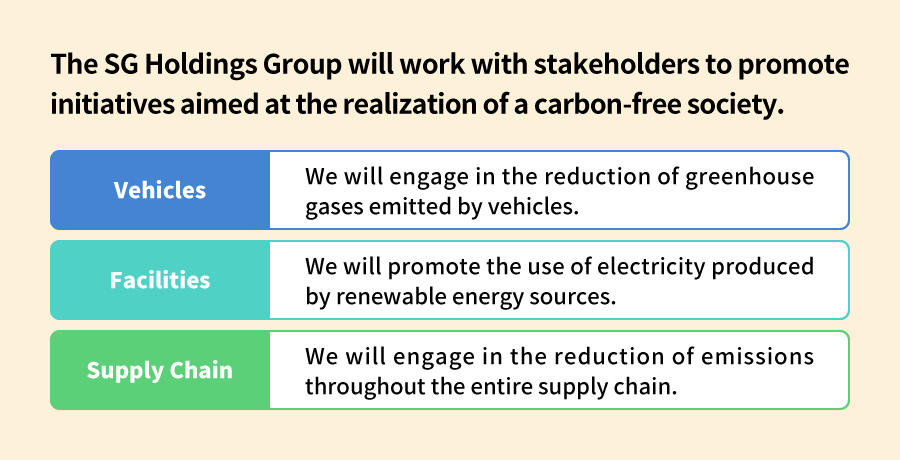
Backdrop to aiming for a carbon-free society
In recent years, climate change has caused severe storms, droughts, water shortages and impact on ecosystems, and addressing these has become a pressing issue. As the trend of aiming toward carbon neutrality accelerates globally, the Paris Agreement was adopted in 2015, and Japan declared in 2020 that it would aim to become carbon neutral and realize a carbon-free society by 2050. As the transition to a carbon-free society progresses rapidly, initiatives to reduce emissions in companies have become important.
Reasons for the Group engaging in decarbonization
The transportation sector including private vehicles accounts for approximately 17%* of CO2 emissions in Japan, and we recognize that it has a significant impact. The transportation of passengers and freight included in the transportation sector is a function deeply related to many industries and everyday life, and reducing emissions in transportation is vital for the realization of a carbon-free society. The Group operates a comprehensive logistics business and uses many trucks. As a corporate group handling social infrastructure in the form of logistics, we recognize that it is our responsibility to take steps aimed at a carbon-free society, and believe that we should further strengthen measures to prevent global warming, which is an urgent issue faced by the world. We will cooperate with stakeholders to engage in the reduction of emissions throughout the entire supply chain.
*Source: "Carbon Dioxide Emissions in the Transportation Sector, Ministry of Land, Infrastructure, Transport and Tourism website. Figures are results for FY2021.
Emission reduction targets
| Scope | Target |
|---|---|
| Scope 1 and 2 | 2030: Reduce CO2 emissions by 46% (*Compared to FY2013) 2050: Aim to become carbon neutral |
| Scope 3 | We will engage in the reduction of emissions throughout the entire supply chain. |
Image of Scope 1 and 2 reductions
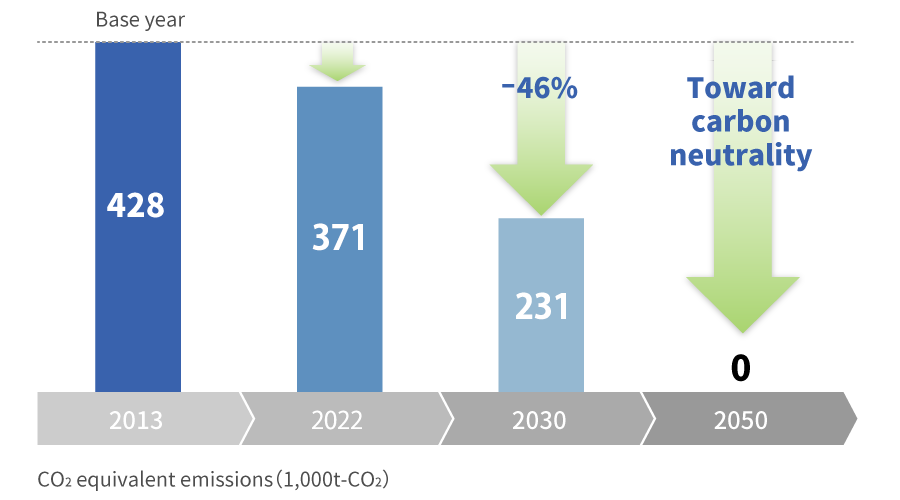
Transition Plans(Domestic)
| Results of FY2022 | Targets of FY2030 | |
|---|---|---|
| Adoption rate of environmentally friendly vehicles including EVs | 64.1% | 98% |
| Renewable energy rate to electricity consumption | 27.8% | 40% |
Reduction level and prerequisites
- Reduction level
- In line with Japan's emission reduction targets
Including offsets using carbon credits, etc. - Prerequisites
- Realization of the 2030 power generation mix* in the Sixth Strategic Energy Plan
(* 59% non-fossil: 36-38% renewable energy, 20-22% nuclear power, 1% hydrogen and ammonia)
*If there are changes in the national reduction level and prerequisites due to social conditions, the emission reduction target may be reviewed.
Boundary
The boundary shall be domestic Group companies (additional responses in overseas Group companies will be considered)
Monitoring
- We will collect data on Scope 1, 2 and 3 to be verified by a third party.
- Through monitoring, we will identify priority areas where CO2 reductions must be made, and take new reduction measures.
Emission reduction measures
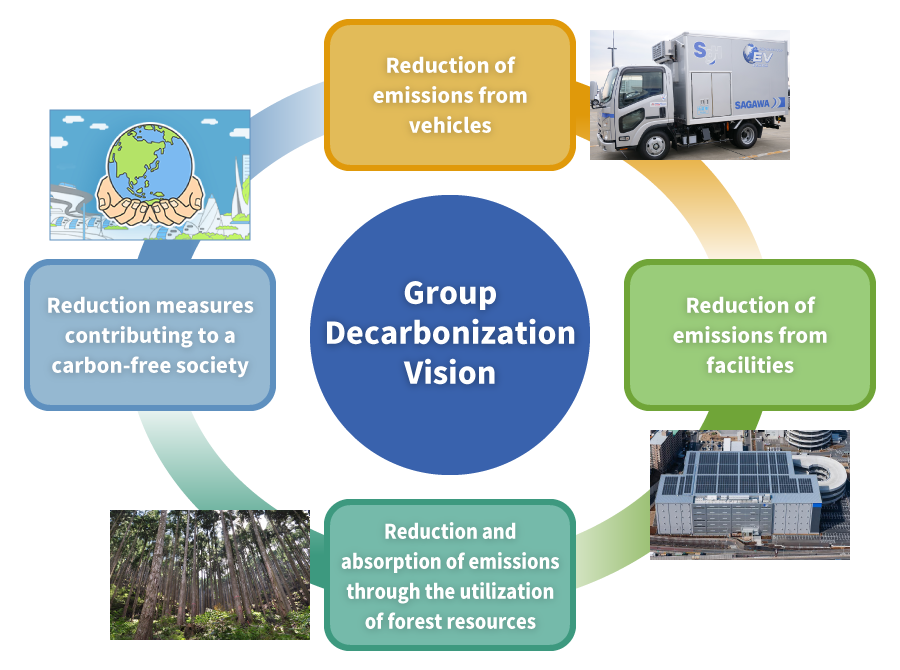
| Item | Major |
|---|---|
| Reduction of emissions from vehicles |
|
| Reduction of emissions from facilities |
|
| Reduction and absorption of emissions through the utilization of forest resources |
|
| Reduction measures contributing to a carbon-free society |
|
*CO2 emitted during material procurement, processing, transportation, construction and disposal associated with construction.
Explanatory video
The SG Holdings Group's Decarbonization Vision is simply explained in a video.
Systems Related to Climate Change
Person Responsible for Climate Change
In the SG Holdings Group, President and COO is responsible for supervising the Group’s policies and responses related to climate change issues related to climate change. Issues related to climate change are reported and discussed at the Sustainability Committee with the representative director and directors as members, and reported to the Board of Directors as needed.
About the Sustainability Committee
Organization chart of other subcommittees under the Board of Directors
Risk Management
Climate change risk is incorporated into the Group’s risk management and assessed annually.
Actual CO2 emissions
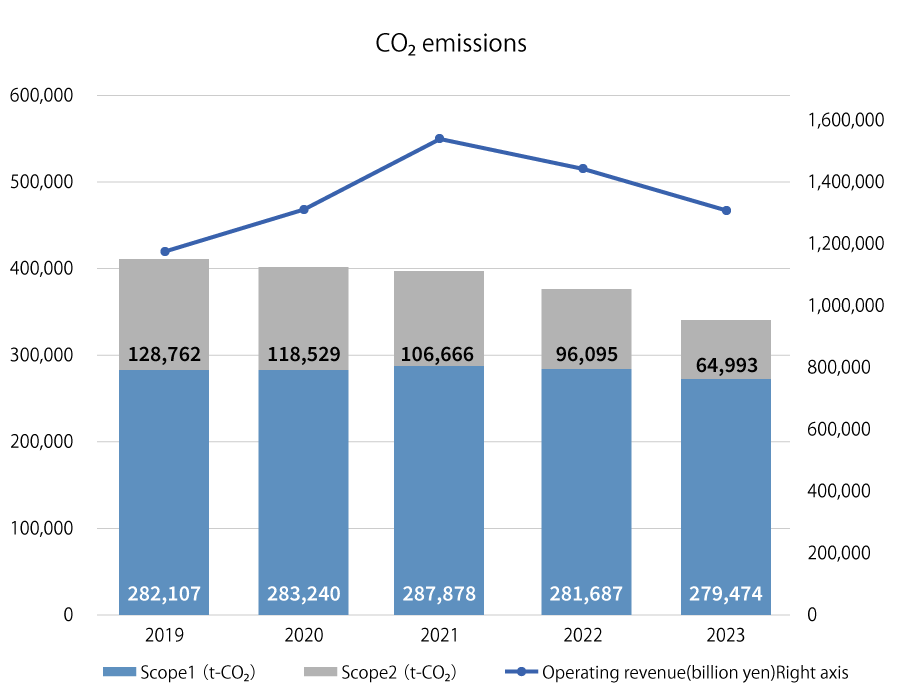
*Please refer to the ESG Book for detailed data on greenhouse gas emissions.
Initiatives aimed at decarbonization
Reduction of emissions from vehicles
Introduction of environmentally friendly vehicles (EVs, etc.)
The SG Holdings Group is promoting the introduction of vehicles with little environmental impact. Sagawa Express plans to gradually introduce light electric vehicles into its fleet. The company is also introducing natural gas trucks, which have less air pollutants (nitrous oxides, particulates, etc.) in exhaust gas, and hybrid trucks boasting good fuel consumption.
Breakdown of Vehicles Owned (Japan)
As of March 31, 2023
| Electric | Hybrid | Natural gas | Clean diesel | Other | Total |
|---|---|---|---|---|---|
| 23 | 2,905 | 1,270 | 12,761 | 9,502 | 26,461 |
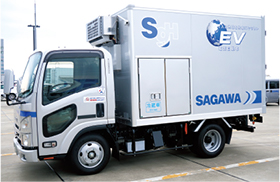
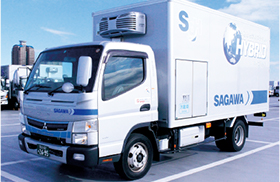
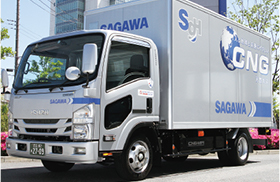
Improvement of transportation/delivery efficiency
The Group is working to reduce CO2 emissions throughout the entire transportation/delivery system. For example, transfer centers and Sagawa Distribution Centers (SRCs) are utilized to promote the improvement of logistics efficiency by limiting the number of trucks used. In 2020, operations commenced at a transfer center consolidating multiple transfer sites in the Kanto region inside the "X FRONTIER®" next-generation large-scale logistics center.
Transfer Centers (Sagawa Express)
The establishment of transfer centers can reduce the number of trucks used.
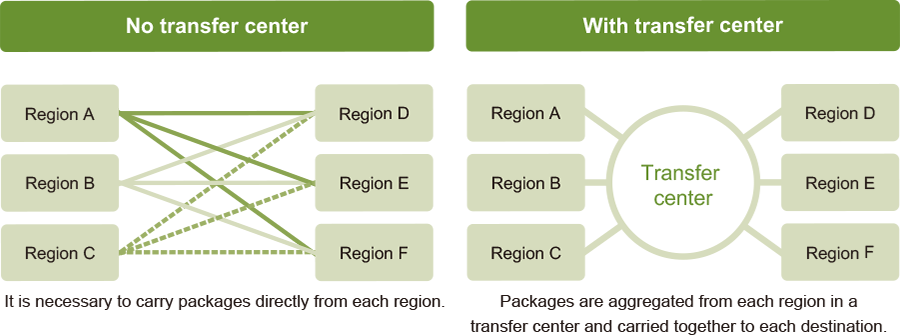
Sagawa Distribution Center (SRC)
SRCs are distribution facilities directly connected to the sales offices of Sagawa Express, and enable the reduction of truck transportation between each process.
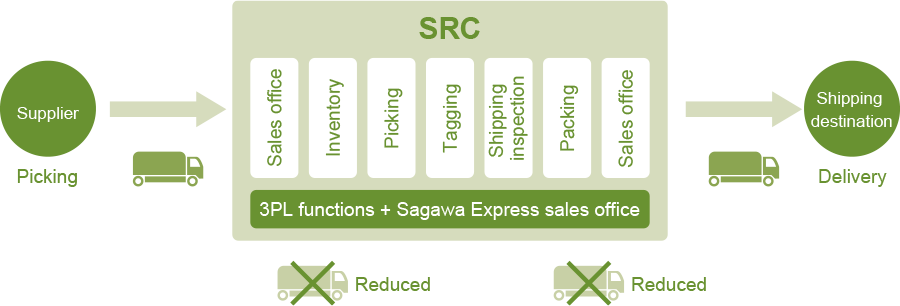
Establishment of Service Centers
Sagawa Express has set up Service Centers nationwide where collection and delivery operations are carried out using carts and bicycles instead of trucks. The Company has also introduced the TRIKE CARGO towing-style electric power-assisted bicycle in sales offices and Service Centers. TRIKE CARGO has a maximum load of 150kg* and enables a large volume of packages to be carried without using an automobile.
Through such initiatives, CO2 and air pollution emissions have been reduced by an equivalent of approximately 1,500 vehicles across all centers
*Tokyo Metropolis and other areas (It differs depending on the ordinance of each prefecture.)
If a Service Center has been established

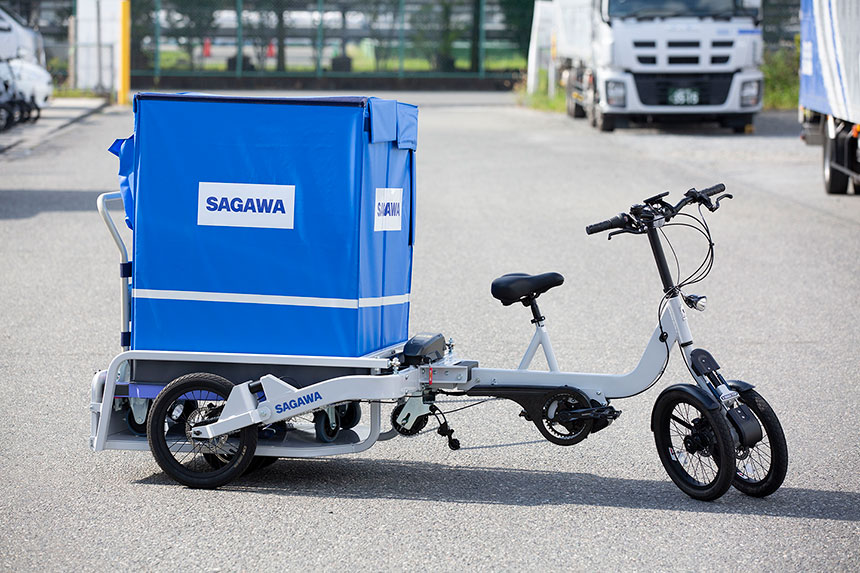
Modal Shift
Sagawa Express is promoting a modal shift, which refers to switching from the transportation of freight by truck to the modes of transportation that have a lower environmental impact, such as train and ship. Modal shift not only reduces CO2 emissions but also contributes to saving energy and labor because a larger volume of freight can be transported at once.
Transportation by Train
In 2004, Sagawa Express began to transport express delivery packages via "Super Rail Cargo" express railway container cars developed jointly with Japan Freight Railway Company. Trains run regularly to and from Tokyo and Osaka and transport roughly 10% of the total shipping volume between Tokyo and Osaka. The total volume transported in both directions is equivalent to 56 ten-ton trucks.
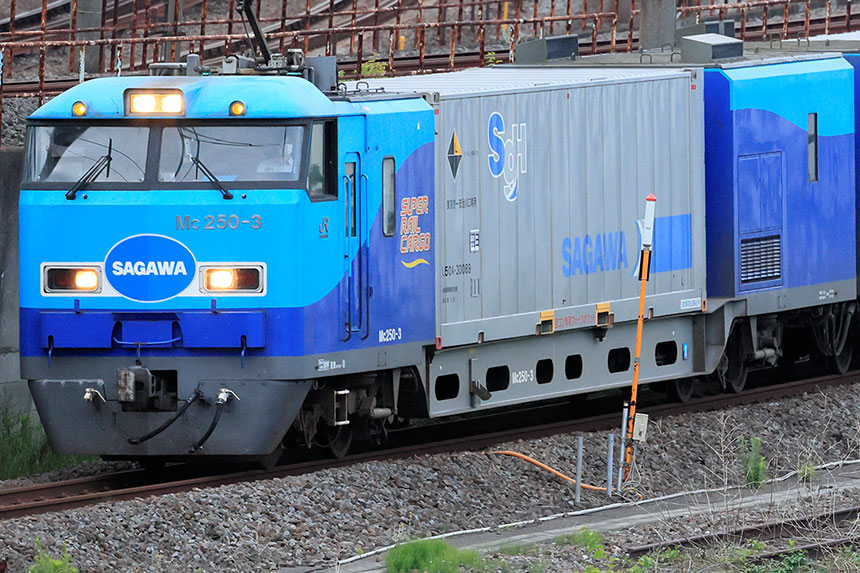
Transportation by Ship
We are engaged in replacing a part of the long-haul transportation from Kanto to Kyushu, which has mainly relied on trucks, with marine transportation. Tokyo Kyusyu Ferry, Japan Post, and Sagawa Express jointly won a special award at the 24th Logistics Environment Awards (sponsored by the Japan Federation of Freight Industries) for a modal shift to using high-speed ferries starting in 2022. Compared to truck transportation, this joint transportation is expected to reduce CO2 emissions by 205.6 t-CO2 per year (approx. 59%) and truck driver hours by 6,204 hours per year (approx. 90.7%).
Idling Stop
Sagawa Express has implemented Idling Stop since 1997. When drivers are away from their vehicles while delivering and collecting to and from customers, and when unloading packages in sales offices, the key is removed from the ignition to stop the engine in an effort to control exhaust gas.
Use of Biodiesel Fuel
Sagawa Express is jointly implementing a sustainable delivery project that allows consumers to voluntarily take part in efforts to reduce CO2 Emissions in collaboration with Euglena, which manufactures and sells biodiesel fuel. This is a new mechanism that allows shippers, companies, and consumers to work together to achieve decarbonization.
If consumers pay the product price plus a voluntary support amount (1,000 yen per unit) when purchasing products from the official Euglena online shopping website, the company and Sagawa Express will contribute the same amount towards the cost of introducing biodiesel fuel with superior environmental performance. The fuel will be used in Sagawa Express delivery vehicles.
Euglena's SUSTEO biofuel is a mixed fuel that contains 20% used cooking oil and Euglena microalgae-based biofuel. Although it emits CO2 when burned, plants and algae absorb CO2 from the atmosphere through photosynthesis as they grow, so emissions can be reduced to net zero.
Using biofuels in delivery vehicles that do not compete with food production or cause deforestation reduces CO2 emissions from vehicles compared to diesel oil derived from fossil fuels.
Reduction of emissions from facilities
Introduction of carbon-free power at business sites
SG Realty, which oversees property management of the SG Holdings Group, develops environmentally friendly logistics facilities with the aim of contributing to sustainable urban development and realizing a carbon-free society.
SG Realty Higashiosaka (Higashiosaka City, Osaka), completed in 2021, utilizes energy conservation (LED lighting and high-efficiency air conditioning) and energy creation (solar power generation system). In addition, when energy generation is insufficient, such as at night, electricity purchased from external sources is CO2-free*1, making 100% of the electricity used in the facility renewable energy.
As an environmentally friendly and sustainable facility, the property received a top-level 5-star rating under BELS (Building-Housing Energy-efficiency Labeling System), a third-party examination that evaluates the energy-saving performance of buildings, as well as the ZEB certification (Net Zero Energy Building*2). At the same time, the building was also granted an A rank in the Comprehensive Assessment System for Built Environment Efficiency (CASBEE).
*1Renewable energy
Energy that is permanently available in nature such as certain earth resources including sunlight, wind power and geothermal heat, in contrast to fossil energy using finite resources such as oil, coal and natural gas.
*2ZEB
Buildings that reduce primary energy consumption at facilities to net zero through energy conservation and energy generation.
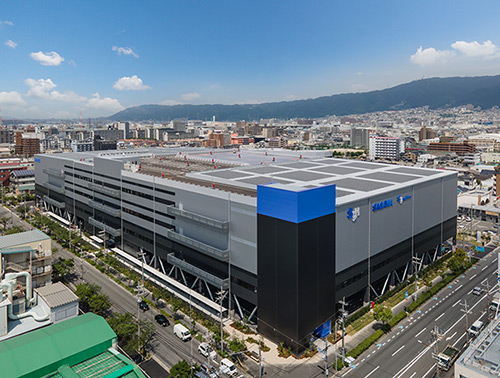
Reduction and absorption of emissions through the utilization of forest resources, etc.
Forest Preservation
Sagawa Forestry, which owns approximately 800 hectares of Sagawa Forests in Kochi and Tokushima prefectures, conducts a forestry protection business to achieve its greatest mission of "protecting the forest cycle." The carbon credits generated from these forests are used to offset a portion of the Group's CO2 emissions associated with its operations.
| Credit type | Carbon offset amount |
|---|---|
| FY2022 | |
| J-Credit SGH Group Kochi & Tokushima Forest Long-Term Management Project |
500 t-CO2 |
*Scope: CO2 emissions from SGH Group business activities (Scope 1 & 2)
Reduction measures contributing to a carbon-free society
We will consider products and services that can lead to decarbonization for customers and partner companies with the aim of reducing CO2 emissions throughout the entire supply chain (Scope 3).
In addition, we are creating video content and booklets, etc., as means of communication aimed at employees and other stakeholders.
Initiatives for Climate Change
Measures to Adapt to Climate Change
Sagawa Express is engaged in the following initiatives aimed at adapting to climate change.
| Purpose | |
|---|---|
| Prevention of heatstroke |
|
| BCP/BCM |
|
Direct Engagement with Climate Change Policymakers
Sagawa Express has concluded disaster agreements with the national government and local governments. In the event of a disaster, based on these agreements, the company helps to transport emergency supplies to evacuation centers, supports the operation of hubs where these goods are collected, and more.
Regarding its response to disasters caused by impacts from climate change, Sagawa Express utilizes its experience in disaster response, regularly coordinating with local governments and other organizations to provide support as early as possible in the event of a disaster. To enable rapid response, Sagawa Express is moving forward with the conclusion of disaster relief agreements with the national government, nationwide local governments, universities, corporations, and other organizations.
Sagawa Express participates in the Japan Climate Leaders Partnership (JCLP) as an executive member, providing the government with recommendations on the issue of climate change through dialogue with government officials, policymakers and industry groups. In this way, the company participates in various external organizations and projects to enhance its communication activities. In addition, the company is also acting as member of the Logistics Environment Measures Committee of the Japan Association for Logistics and Transport and a supporting member of the Japan Climate Initiative.
Promoting Environmentally Friendly Business Activities


